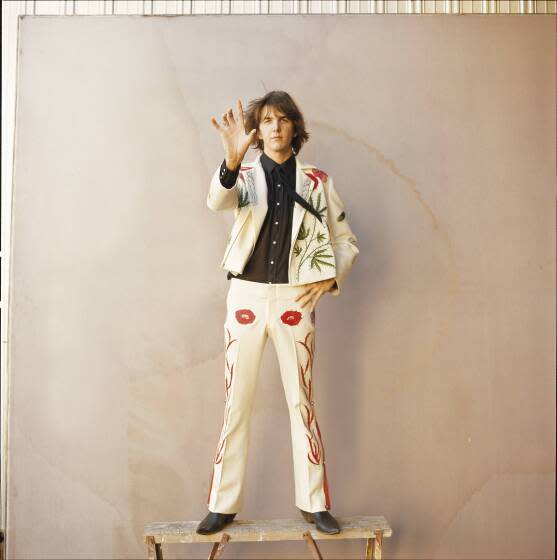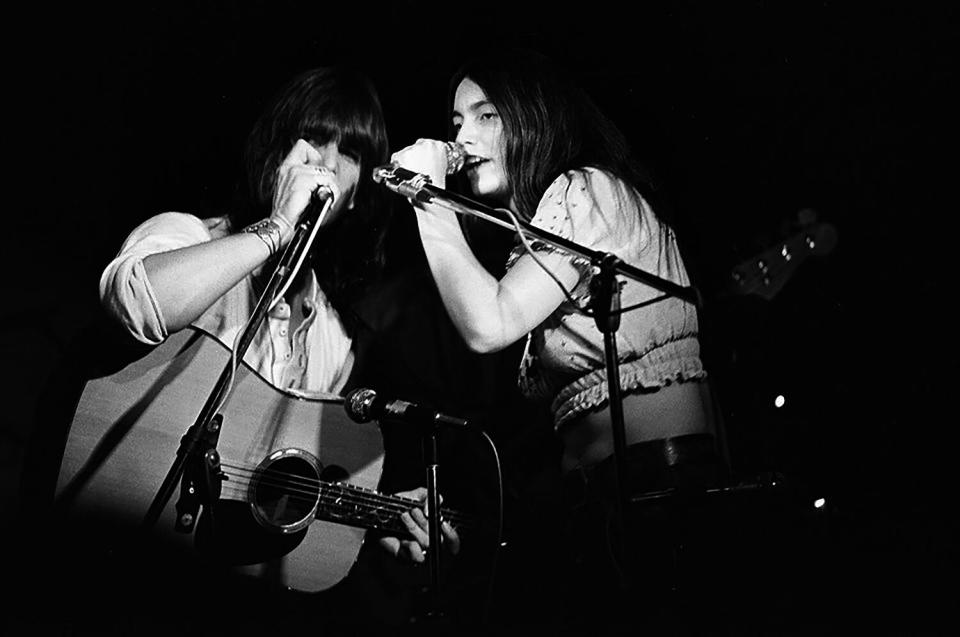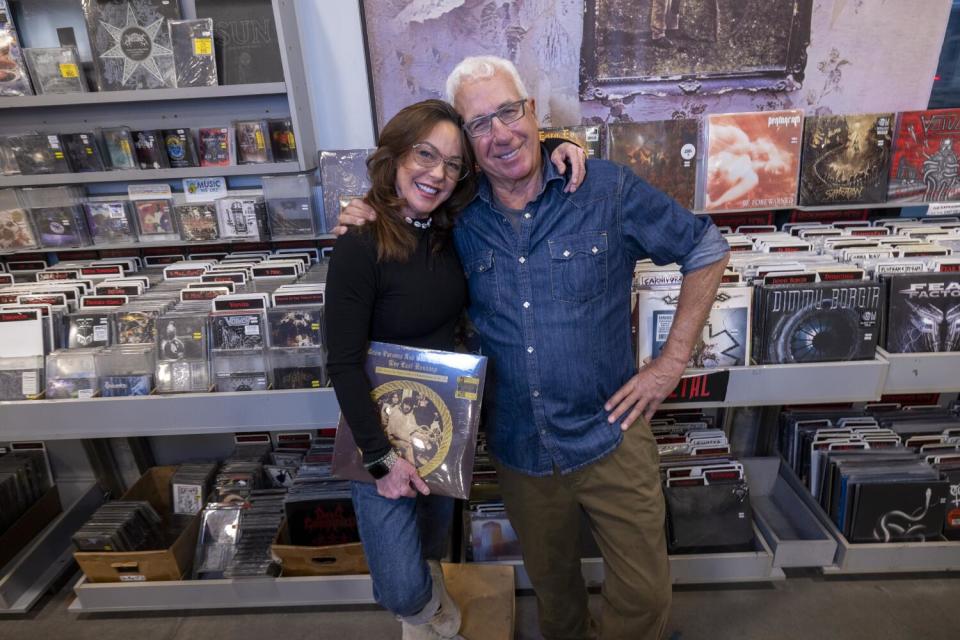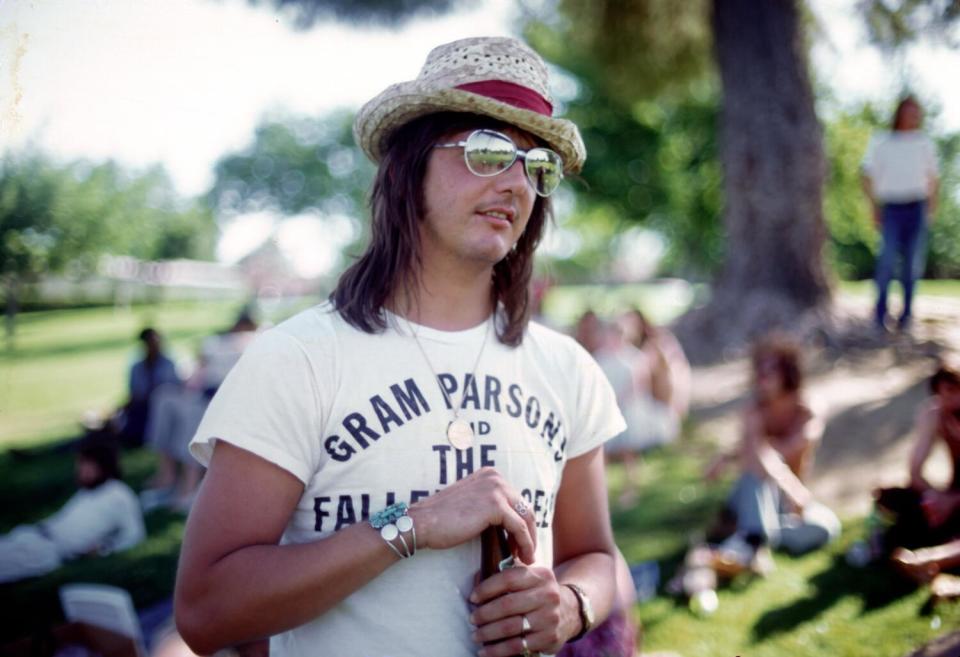How a beloved L.A. record store unearthed a long-lost Gram Parsons recording

Gram Parsons’ only child, Polly Parsons, is no stranger to her father’s ghost. She’s been known to take occasional trips out to the desert to the Joshua Tree Inn to stay in Room 8 — where her father died of an overdose on Sept. 19, 1973, at age 26 — and commune with his spirit. And when invited, she readily agrees to meet at the Chateau Marmont, where the country-rock pioneer lived off and on during his time in Los Angeles, particularly around the making of his debut solo album, “GP.” (The cover of that LP features him sitting in the hotel lobby, hat hanging on his chair and bottle of something ominous sitting on the table.)
“Oh, goodness,” Polly says, sitting down at the Chateau's restaurant, noting with an air of apprehension that she hasn’t granted an in-depth interview about her dad in some time. With a bright gaze that calls to mind Gram’s International Submarine Band song “Blue Eyes,” from 1968, the year after she was born, Polly surveys the scene around her, which is still about as rock ’n’ roll as it gets in 2023: Radiohead bassist Colin Greenwood is at a table nearby, and actor Casey Affleck soon saunters by.
But with some of Gram’s Southern roots rubbing off on her — these days, Polly splits time between L.A. and Austin, Texas — she’s sociable and open, glad to be in a place of significance to her father, whose estate she helps manage. In recent years, her side of managing that estate has involved embracing her father's influential style by creating a line of Gram-inspired, Joshua Tree–worthy merch (not only T-shirts and guitar straps but also leather-wrapped whiskey glasses). Still, she’s keen on not letting the discussion stray too far from the music, particularly when it comes to a new archival release due out on Black Friday's Record Store Day: “The Last Roundup: Live From the Bijou Café in Philadelphia March 16th 1973.”
“There’s a much larger discussion to be had about Gram Parsons than the one that we’ve been having for the last 40 years,” she says.
The story of Gram Parsons is so imbued with rock star mythos that it can be disorienting to sit across from someone who proves that he was, in fact, a real person and not some Nudie Suit–wearing apparition. Parsons was raised in Georgia and Florida as an heir to a citrus empire flush with money and tragedy; his father died by suicide and his mother of alcohol-related cirrhosis. Armed with a trust fund and substantial emotional baggage, Parsons embarked on a brief but profound musical career, writing in an uncanny hippie-ish country style that was as trailblazing as it was obviously unburdened by the need for commercial success.
He was adored by peers like Keith Richards, who took some of Parsons’ “cosmic country” vibe and applied it to the Rolling Stones. And it’s a straight line from Parsons to contemporary acts like Wilco and My Morning Jacket, which carry on a progressive Americana sound.
But Parsons could never keep his own ship steady, instead jumping from band to band — the Byrds, the Flying Burrito Brothers — and aggravating his bandmates with inconsistency and substance abuse.
Read more: A rock star’s legacy lives on in Joshua Tree 50 years after his shocking funeral pyre
Eventually, he went solo, enlisting the vocal talents of a then-unknown Emmylou Harris, as well as members of Elvis Presley’s TCB band such as James Burton and Glen D. Hardin, to perform on “GP.” But when it came time to go on the road in 1973 to support the album, the TCB band was unavailable (or too expensive), and a ramshackle group known as the Fallen Angels was put together to join Parsons and Harris on a run of club dates: Neil Flanz on pedal-steel guitar, N.D. Smart II on drums, Kyle Tullis on bass and Jock Bartley on electric guitar. It would become a notorious chapter during some of the final months of Parsons’ life, lacquered thick with drugs, booze, fights and at least one arrest.

Some of the shows — especially early on — were by all accounts very rough. Bartley, for instance, was hired so abruptly that he learned his guitar parts on the tour bus amid the chaos. “Pardon me for saying,” Bartley said in a phone interview, “but a couple of times, Gram probably couldn’t even stand up too well.” Yet there were also shows where it all came together to become pure magic — where the combination of talent, taste and excess alchemized into alt-country heaven — proof of which spent many years lost in the recesses of Amoeba Music.
Here’s how that happened: Dave Prinz, a co-founder of the record store chain, began collecting Parsons archival material in conjunction with his role in the 2007 release of a Flying Burrito Brothers concert recording, “Live at the Avalon Ballroom 1969.” The Avalon set was dubbed “Gram Parsons Archives, Vol. 1” and put out under Prinz’s new Amoeba Records label, but no subsequent volumes surfaced. It turned out that Prinz did indeed have more but had just gotten sidetracked over the years. And during the recent move of the L.A. Amoeba record store, Prinz rediscovered the “Last Roundup” tapes. He fired them back up and was bowled over.
“I’d never heard any Gram and Emmy where you could hear their voices like this together,” Prinz says over the phone from his home in Marin County. “It’s kind of pure, and it’s kind of raw, but it’s just kind of great too.”

Prinz, now 70, in his youth saw Parsons perform for sold-out rooms, but the turnout on this particular Philadelphia night in 1973 was clearly not great. After stellar renditions of Parsons songs like “The New Soft Shoe” and “Sin City,” you can hear just a light spattering of barely polite applause. (Another hard-to-believe moment: When Parsons mentions “The Gilded Palace of Sin,” the acclaimed 1969 Flying Burrito Brothers LP, he pauses briefly for applause; instead, you could hear a pin drop.) But even with a lackluster crowd — or perhaps because of it — the band plays with charm and focus.
Listening to the recording, it’s difficult to recognize Parsons as the same person who could barely stand at points on this tour.
“I think that’s a statement to the fact that addiction is not linear,” says Polly, who has been candid about her own earlier struggles with sobriety, and who at one point operated a sober living facility in Austin — named Hickory Wind, after one of her father’s Byrds songs. “The journey is always accompanied by amazing clarity; it’s always accompanied by highs and lows.”
After this particular show was over, Flanz, the pedal-steel player, saw it as a moment of greatness and had the good sense to request the soundboard recording, which he then kept for decades, before eventually selling to Prinz in the 2000s. (Flanz died in 2021.) With no interest to involve a bigger record company, Prinz instead decided to fire up the dormant Amoeba Records label again, initiating a Kickstarter campaign to fund the release independently. He raised almost triple the $50,000 goal, and, with the blessings of Polly and Harris, the project was off and running. (Gretchen Parsons-Carpenter, Gram’s widow, is still connected to the estate but was not involved in the project; she did not reply to an interview request.)
It’s an untraditional path for a release from such an influential artist, particularly one whose legend grows by the year and for which there’s an increasingly limited amount of material to work with. (Parsons’ entire career can essentially be bottled up into five years of work.) But Polly believes her father “would have loved how inclusive” the Kickstarter method was.
“It was really important to me that the people who love Gram felt a contribution, a stake in the subject matter,” Polly says. “This was a beautiful offering to the world, and how much more enjoyable and meaningful is it when you have an actual say if it comes to fruition or not?”

Prinz sees the set as being a quintessential addition to the discography of Parsons. “There’s a lot of books written about Gram and articles and this and that,” says Prinz, “but there’s not that much music that’s come out that proves it. And I really feel like this album proves it — that proves [Parsons and Harris were] one of the best country duets of all time.”
With Parsons, though, the story will always partly be about his end — about how he smoked the rock ’n’ roll lifestyle to its filter, before having his corpse stolen and set aflame in Joshua Tree. The theft and incineration was carried out by tour manager Phil Kaufman, a Manson-adjacent rebel who said he was operating under the desires of Parsons, and roadie Michael Martin. That chapter has reasonably upset members of Parsons’ extended family, but Polly says she’s at peace with the saga now.
Read more: The unmasking of the narcissistic, conspiracy-spreading baby-boomer rock star
“It was difficult as a young child to come to terms with it,” she says. “But as a grown woman, I find it charming in some way that your best friends would go to that length to carry out your wishes.” That said, she wishes people wouldn't get too lost in the lore, either. “I would hope that we would be a bit more interested in delving deeper,” she suggests.
Prinz is already on the hunt for a new installment in the Gram Parsons archive, this one being a real Holy Grail: Parsons’ long-lost first solo album, produced by Terry Melcher. Prinz says he’s heard a recording of a party at the Chateau in which you can hear the album playing in the background, so he knows it’s real. And he has a lead on where the tapes might be in storage. “Supposedly, it’s in a vault in England somewhere,” he says. “And I’m gonna find it.”
This story originally appeared in Los Angeles Times.
